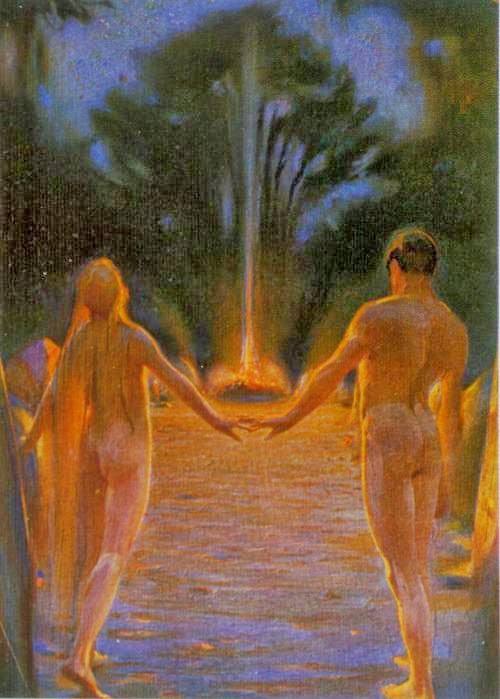Archeofuturist
October 25, 2013
 This post will attempt to summarize the famous Nordicist Richard McCulloch’s views on romantic, monogamous love (which happen to be very similar to my own). People are different, but for the vast majority of us this is the natural and healthy form, regardless of what Judith Butler and other queer theorists may try to make us believe.
This post will attempt to summarize the famous Nordicist Richard McCulloch’s views on romantic, monogamous love (which happen to be very similar to my own). People are different, but for the vast majority of us this is the natural and healthy form, regardless of what Judith Butler and other queer theorists may try to make us believe.
McCulloch has some interesting things to say about pre-marital sex and “sexual idealism” in his book Destiny of Angels. They are interesting because they take the question of monogamy from the religious, conformist and moralist level, to the personal level. And it is often exclusively on this level we can convince our contemporaries of the validity of traditional values.
What both McCulloch and I assert, is that the monogamous relationship is not just the best thing (for most of us) because Jehovah or Allah says so, but also the best thing from a personal perspective. A lifelong relationship becomes, at least ideally, qualitatively better all the time, while quantitatively numerous relationships become “much the same”; several short meetings that never get the time to develop qualitatively. A monogamous relationship is a potential lifelong adventure, while a promiscious lifestyle never manages to leave square one, and is also an expression of the same consumption mania that permeates the rest of modern society (the only difference is that those who have watched a bit too much Sex and the City or read a bit too much Penthouse Magazine consume partners, bodies, instead of clothes and furniture. “Gotta try them all”).
McCulloch also claims that one risks to lose the ability to this qualitative development if one is too “generous” with it. The magic disappears, and what’s left is a disillusioned 35-year-old single that wants to, but can’t really fall in love. This is why a society with a monogamous, romantic norm produces happier people. That it also produces more stable and harmonic families, and thus more numerous and stable children, is another positive effect.
 McCulloch distinguishes between “rough/coarse composite” and “finer composite” features, both aesthetically and ethically (of course with the Nordish races always being the finer composite, since he’s a Nordicist). Anyway, virtue, nobleness, honour, loyalty, self-control and awareness, are characteristics that he sees as finer composite.
McCulloch distinguishes between “rough/coarse composite” and “finer composite” features, both aesthetically and ethically (of course with the Nordish races always being the finer composite, since he’s a Nordicist). Anyway, virtue, nobleness, honour, loyalty, self-control and awareness, are characteristics that he sees as finer composite.
Sexual idealism is an interiorly developed and upheld moral codex, one of the necessary parts of honour – the inner strength of will and determinance to do what is right without consideration for what desires may want – being made possible by a highly developed degree of self-awareness and self-control.
Sexual idealism is a necessary requirement experiencing the deepest and most complete form of romantic love. This form of love is so intense and burning, and absorbs so much emotional and spiritual energy, that it cannot be created, destroyed or recreated easily, and that is why it must be loyal and concentrated, bordering upon obsession, upon one single person, in its striving for a permanent union that will stand the tests of time.
Anyway, the way I understand the reasoning, sexual idealism is then good for two things. First, it is part of the finer composite characteristics (self-control, etc.), while promiscuity is coarse composite, and even animalistic. Second, it enables man to experience full romantic love, while promiscuity kills that ability in humans.
I suspect that the same reasoning is to be found in the Church?
 Daily Stormer The Most Censored Publication in History
Daily Stormer The Most Censored Publication in History



